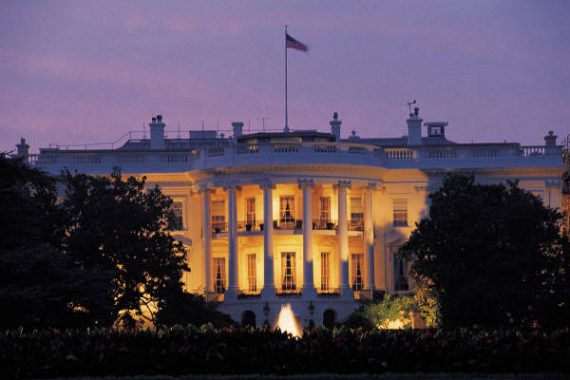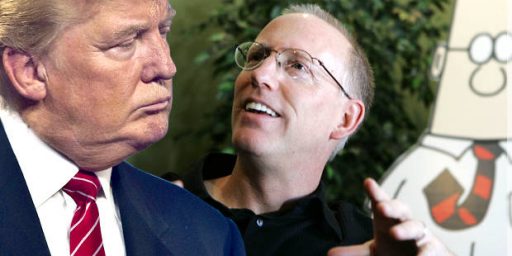Time For A Single, Six-Year, Presidential Term?
An idea whose time has come? Not really.
Writing at National Review Myra Adams, who worked as a campaign aide and adviser on the Bush 2004 and McCain 2008 Presidential campaign, argues in favor of the idea of limiting the President to a single six-year term:
The strongest argument for one six-year term is the “second-term curse.” The last four two-term presidents – starting with Nixon and going forward with Reagan, Clinton, and Bush – all had difficulty in their second terms.
Resignation, scandals, impeachment, and total economic meltdown – was it just a coincidence that all four of these presidencies unraveled in years six through eight? (Reagan’s unraveled the least, but Iran-Contra was a huge distraction.)
Even worse: President Obama’s last two years have yet to begin and already his leaderless presidency is in complete shambles, with numerous foreign and domestic crises spiraling out of control.
Therefore, historically speaking and especially today, one six-year term is an idea whose time has come. The benefits are that it would embolden presidents to take risks, make difficult decisions, and exert bold leadership while reducing fear of political retribution. Then, just before the beginning of historically the worst time for a two-term president, he or she is out.
Now consider some new presidential math – “one six equals two four.”
The last two years of a six-year term would be when traditional lame-duck status sets in. That means one six-year term is reduced to only four full years of primetime effectiveness. Compare that to two four-year terms by subtracting two years for reelection distraction and then two final lame duck years and you have exactly the same four years of presidential prime time!
One major difference is that during one six-year term there would be only two mid-term elections where the president ostensibly could be held accountable, as opposed to three mid-term elections within two four-year teams. And, just like now, if he or she was unpopular, voters could shift control of the House and Senate from one party to another.
Then, here is an interesting quandary, leading to the most important reason why one six-year term would be good for America.
In our age of instant and 24-hour news cycles leading to information overload, Americans have developed shorter attention spans and thus tire more quickly of brands, fads, and celebrities, including their president.
Yet the last three presidents been reelected. That’s higher than the historic reelection rate of 68.7 percent. In the 57 U.S. presidential elections, 32 have involved incumbents and 22 of those incumbent candidates have won. Pretty good odds, huh?
And with the indisputable and growing power of the presidency coupled with an over-sized federal government under the president’s control, incumbent presidents are becoming more likely to be reelected.
This is a dangerous trend that one six-year term would blunt.
The current state of presidential reelections has become a major time burden that reduces a president’s ability and desire to pass long-term, politically unpopular solutions to difficult national problems.
There’s much to digest here, but perhaps we should start with some of the things that Adams gets wrong. She contends, for example, that a six-year single term Presidency would mean that there would only be two midterm elections in a single Presidential term as opposed to three as there are now. The first problem with this argument, of course, is that there are actually only two midterm elections during a Presidential term that lasts for the full eight years permitted by the Constitution, one during the President’s second year in office and the other during the President’s sixth year in office. The other Congressional election that Adams is referring to is the one that occurs during the same year that a President is running for re-election and has never actually been referred to, or considered, a mid-term election. Yes, it’s correct to say that those races are as much a test of the public’s approval of the President’s agenda as the races that occur in year two and six, but because it occurs at the same time as a Presidential race it’s a completely different kind of race.
Perhaps Adams meant to say that there would only be two Congressional elections during a single six-year term, in which case she’d be correct but it strikes me that she’s simply stating a tautology without really explaining why the fact she’s pointing out is a good thing. If Congressional elections are a check on Presidential power and ambition, then isn’t it a good thing that are more of them during a Presidential term rather than fewer of them? After all, the fact that there would be two elections during a six-year term doesn’t matter so much as when those elections would be. The most likely arrangement would be one where there are Congressional election when a President is elected, and then again during the second and fourth years of his or her six year term. This wouldn’t provide anymore of a check on Presidential power and ambition than the current arrangement where there are Congressional elections during years two, four, and six of an eight year term it seems to me, and it potentially could provide less since it would mean that after year four a President limited to a six year term would feel him or herself unencumbered by public opinion in the final two years of his term. A President in such a position would not need to worry about the people pushing back on his agenda via the ballot box at Congressional election, and he would not need to worry about standing for re-election at any point during his Presidency. Rather than halting the growth of the power of the Presidency that Adams, rightly I think, laments, the solution she proposes could potentially actually help to accelerate that accumulation of power by making the Presidency even further removed from the popular will than it already is.
Conversely, of course, one could argue that the single term that Adams proposes could actually reduce a President’s ability to do their job. It’s already fairly well established that a President who is elected to two terms ends up becoming a Lame Duck at some point well before their term actually ends. Quite naturally, this happens because public attention starts to shift to the upcoming Presidential elections and even members of the President’s own party in Congress start to look to their party’s candidates for President for leadership going forward rather than relying on someone who is going to be out of office in less than two years. If the President’s party happens to lose control of Congress during those final two years, as seems likely for President Obama and the Democrats in two weeks, them the descent in to that status becomes inevitably accelerated, which is why you typically see Presidents spend the last two years of their time in office diverge off into areas that don’t require Congressional approval, such as foreign policy or Executive action in areas where Congress has already granted the President discretion to act without Congressional approval. In some sense, a President who is limited to a single six year term would be a lame duck from the minute they took the Oath of Office. Yes, they would still wield the considerable levers of Presidential power, but their ability to hold sway over Congress would likely be significantly limited. Given the fact that the Constitution has always presumed that Congress would be the more powerful of the two branches, this may not be a bad thing but it would certainly be a big change from what we have today.
In other words, a single six-year term would likely embolden a President to act in areas where Congressional approval isn’t needed, because they wouldn’t need to worry about facing voters themselves, and weaken the Presidency vis a vis Congress when it comes to other areas, such as domestic policy. I’ll leave it to the reader to judge whether or not this is a good thing, but it would certainly be a change and it isn’t at all clear that it would be change for the better as Adams suggests. Leaving aside the fact that, as a practical matter, this is a change that isn’t likely to ever be enacted, it strikes me that Adams’s idea is one best left on the shelf. The two-term system we have now isn’t perfect, and some have suggested that we change that to allow Presidents to serve more than two consecutive terms, but Adams hasn’t persuaded me that her alternative would be any better.







This would guarantee that two thirds of all Senators always face election in midterm years. And, one third of all states would have both Senators elected in midterm elections. Now, if all Senators faced the electorate at the same time, always on the presidential election year, that might be more interesting…
But, more reasonably, we could eliminate the lame duck problem by just doing away with the two term limit.
I’m not sure getting rid of the lame duck period would be a good thing though — it slows the rate of change, and ensures that big policy changes happen early in the Presidency, and are then implemented and stable before the next set of big changes.
True. In fact I wonder why you went here. You did remind me why I quit reading NRO.
Whoever Myra Adams is, she seems unable to follow a logical train of thought. You point out her confusion over mid-term elections. She also says the historical average for re-election is 68%, but we’re three for the last three, which would be 100%. But we’re also three out of the last four, which is close to the historical rate. She argues Obama’s administration is a leaderless shambles, which even if true would not be an argument for changing the system unless you think it will be true of all prezes.
Reading the whole piece, she’s outragedthat Obama is still here and thinks he’d be gone sooner with her plan. However, I suspect the real reason is unstated. The reason the Constitution limits a prez to two terms is that Rs got it amended out of fear another Dem would duplicate FDR’s three or more terms. What’s motivating this is a recognition that A) Dems may have a demographic advantage in prez elections, and B) the prez’s party tends to lose in mid term elections. So lets have 2/3 rather than 1/2 be mid-terms. I don’t think she’s really at all confused about mid-term arithmetic, she’s obfuscating.
I agree with Gustopher, get rid of the two term limit. There are two presidents who might have gone on to a third term Reagan and Clinton. Reagan was beginning to shows signs of dementia (please, no wise cracks) so he might have been advised to retire. If Clinton had gone to a third term 9/11 probably would not have happened.
If wishes were fishes, we’d all cast nets.
A one term presidency…. Naw, I don’t think so. They only get one shot at looting the country so I don’t think their attention is going to be focused on the proletariat, do you?
The whole “second-term curse” business is very clumsily argued here. It lumps together vastly different kinds of troubles a president can face. Bush’s second term was characterized by major legislative failure, economic collapse, and a hapless war that drove his approval rating to record lows. Clinton was impeached in his second term, but he ended his presidency with high approval ratings and a burgeoning economy. And the line about how Iran-Contra was a “distraction” really made me laugh. Reagan himself may have not been personally implicated (and that’s a very debatable proposition), but only a partisan hack or a hopeless prude would think the Lewinsky scandal was in any way a more serious abuse of power. As for Obama, he’s been a legislative lame duck ever since Republicans took control of the House in 2010. His troubles aren’t a “second-term curse”; they’re an “unprecedented Republican obstructionism no matter what the term” curse.
Ironically, that´s EXACTLY what Mexico does.
Well, if we’re talking about silly suggestions, why don’t we go to a parliamentary system?
A post based on a column based on nonsense. Reading Ms. Adams piece is like reading a comment by Jenos…factual errors, mis-information, and hyperbole.
Yeah…Let’s go to a single 6-year term because this woman suffers from ODS, just like you.
I remember reading that Carter and Ike both thought a single six year term would be an improvement. I don’t think this article makes a great argument for it , but I’m not so quick to dismiss the idea. I like it better than lifting term limits, anyway.
@gVOR08:
Now I was going to object that her argument was about as deep as a petri dish lid, but you showed me a complexity to her thinking that I had missed (because I AM just an ignorant cracker). I still think the whole lacks the depth that Doug seems to see, but I do thank you for bringing your point to my attention.
As for obfuscating, allow me to paraphrase the words of a friend of mine who is an anthropology professor (his words about school administrators):
conservatives don’t
lieobfuscate because they are evil or deceitful, they obfuscate because with out obfuscating, they would have nothing to say.1) The lame duck period would start immediately upon swearing in for a six-year term.
2) In order to preserve the numerical balance created for House, Senate, and President, we would need to make the terms of Senators 4 years long — or perhaps 8.
3) We have already seen that eight years is not long enough for a good president with strong leadership skills. On the other hand, four years is too long for a bad president. Six years would be the worst of all worlds.
Does anyone remember “The People’s Almanac” from the md-70s? It had an unusual proposal for a three-person Presidency with staggered six-year terms, with three different roles, and each person would move up every two years. The ‘1st-term’ president would cover ceremonial duties, the ‘2nd-term’ president would concentrate on domestic issues, and the ‘3rd-term’ president would have greatest senority and lead foreign policy. I don’t recall how party affiliation played out in this fanciful scheme.
I just don’t see a problem that needs fixing. Well not with the Presidency , anyway.
We do need term limits for Congress. That bears discussion.
@Shirt:
Better take your meds…. you’re delusional.
I do not favor formalizing into law the possibility of 6 years of lame duck status.
Now if you want to change things to make House terms 4 years, and term limit them to 3 terms (my hope would be that expanding a House term to 4 years will reduce the permanent re-election fundraising that goes on now), and keep the Senate at 6 years, and term limit them to 3 terms – I might be interested.
I keep forgetting to click on this article. Yeah, it’s a bad idea.